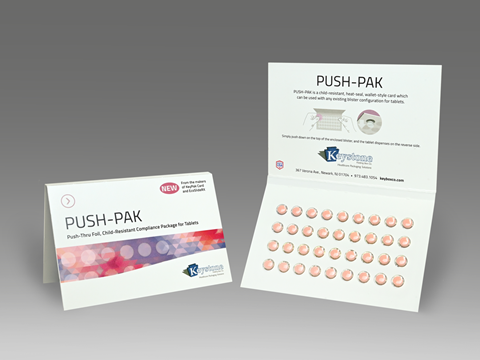
Paperboard packaging company Keystone Folding Box Co. has introduced a new child-resistant blister wallet with push-through opening, aiming to reduce overall package size and utilize less material.
Designed for hard tablets, the company’s Push-Pak has push-through dosage access and a more condensed blister arrangement that reduces the package’s overall size. The company says its blister wallet also provides the highest-possible F=1 child resistance while remaining easy to open for seniors and consumers with dexterity challenges.
The package is primarily comprised of paperboard made from a renewable material, which Keystone says allows for a minimally sized blister. It claims Push-Pak may use up to 75% less plastic than plastic bottles when packaging the same number of tablets.
Push-Pak aims to fit more medication in a smaller package, utilizing less overall material. The resulting blister wallet is said to be better for the environment and easier to transport and store, while still retaining space on the front and back for labels and instructions.
Keystone states the wallet cards are ideal for physicians’ samples and prescription pharmaceutical products. From a safety standpoint, the wallet’s tear-resistant paperboard design combines with a perforation and nick pattern for child-resistance despite being simple for adults to open.
In similar news, TekniPlex Healthcare and Alpek Polyester developed the ‘world’s first’ pharmaceutical-grade PET blister film containing post-consumer recycled content, which was showcased at Pharmapack 2024. It is hoped that the solution will unlock more sustainable pharmaceutical packaging solutions without impacting material quality, product protection, or patient health.
Sanofi Consumer Healthcare recently joined PA Consulting and PulPac’s Blister Pack Collective in a bid to produce fibre-based blister packs that can be recycled in the paper waste stream and phase out ‘problem plastics’ in pharmaceutical packaging. Formed in 2022, the Collective consists of businesses in the pharma, consumer health, and FMCG industries and intends to create a tablet blister pack made of PulPac’s Dry Molded Fiber.
If you liked this story, you might also enjoy:
How are the top brands progressing on packaging sustainability?
The ultimate guide to global plastic sustainability regulation














No comments yet